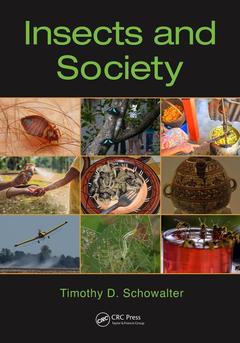Insects and Society
Auteur : Schowalter Timothy D.

Recommended in CHOICE, February 2021
Insects are all around us, outweighing humanity by 17 times. Many are nuisances; they compete with us for food and carry some of our most devastating diseases. Many common pests have been transported worldwide by humans. Yet, some recent reports suggest dramatic declines in some important groups, such as pollinators and detritivores. Should we care?
Yes, we should. Without insect pollinators we?d lose 35% of our global food production; without detritivores, we would be buried in un-decayed refuse. Insects are also critical sources for nutritional, medical and industrial products. A world without insects would seem a very different and unpleasant place. So why do insects inspire such fear and loathing?
This concise, full-color text challenges many entrenched perceptions about insect effects on our lives. Beginning with a summary of insect biology and ecology that affect their interactions with other organisms, it goes on to describe the various positive and negative ways in which insects and humans interact. The final chapters describe factors that affect insect abundance and approaches to managing insects that balance their impacts.
The first textbook to cater directly to those studying Insect and Society or Insect Ecology modules, this book will also be fascinating reading for anyone interested in learning how insects affect human affairs and in applying more sustainable approaches to "managing" insects. This includes K-12 teachers, undergraduate students, amateur entomologists, conservation practitioners, environmentalists, as well as natural resource managers, land use planners and environmental policy makers.
1 Introduction 2 What Makes Insects Different? 3 Insect Effects on Human History 4 Nuisances 5 Structural Pests 6 Venomous and Poisonous Arthropods 7 Parasites and Disease Transmission 8 Crop Pests 9 Forest Pests 10 Insects as Food 11 Medical and Industrial Materials 12 Cultural Value and Artistic Expression 13 Crop Pollination 14 Decomposition 15 Biological Control 16 Forensic Science 17 Insects as Indicators of Environmental Change 18 Why Do Insects Become Pests? 19 Deciding When and How to Control Insects 20 Concluding Remarks
Prof. Timothy Schowalter received his Ph.D. in Entomology from the University of Georgia, USA (1979), where he studied insect responses to forest harvest practices. He subsequently trained as a postdoctoral fellow at Texas A&M University, USA, studying bark beetle population dynamics and effects on pine forest ecosystems. He continued to work on insect responses to changing forest conditions and effects on forest ecosystems as a professor at Oregon State University, USA, for 22 years (1981- 2003). Much of his research has been in conjunction with the US Long Term Ecological Research Network. Prof. Schowalter moved to Louisiana State University in 2003 as Department Head of Entomology, serving in that capacity until 2015.
Date de parution : 01-2020
18.9x24.6 cm
Date de parution : 01-2020
18.9x24.6 cm
Disponible chez l'éditeur (délai d'approvisionnement : 14 jours).
Prix indicatif 123,78 €
Ajouter au panierThèmes d’Insects and Society :
Mots-clés :
Family Tenebrionidae; forest pests; Mole Cricket; structural pests; Romalea Microptera; venomous arthropods; Forest Tent Caterpillar; crop pollination; Codling Moth; edible insects; Long Horned Beetles; Honey Bee; Tussock Moth; Hermetia Illucens; Southern USA; Dendroctonus Frontalis; Southern Pine Beetle; Wood Boring Beetles; Douglas Fir Tussock Moth; Stink Bug; Moisture Content; Biological Control Agents; Subterranean Termites; Bark Beetles; National Academy; Dampwood Termites; Boll Weevil; Australian Funnel Web Spiders; Carpenter Bees; Brown Recluse Spider



